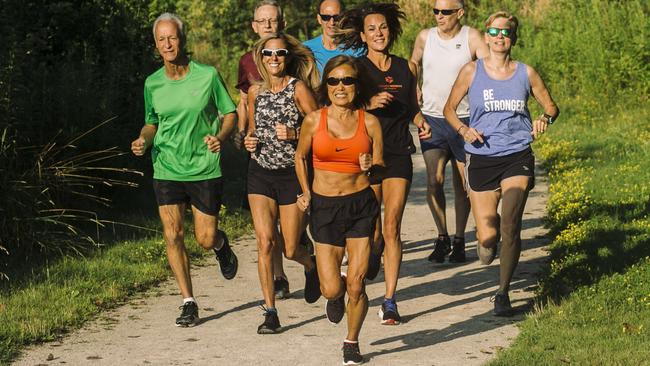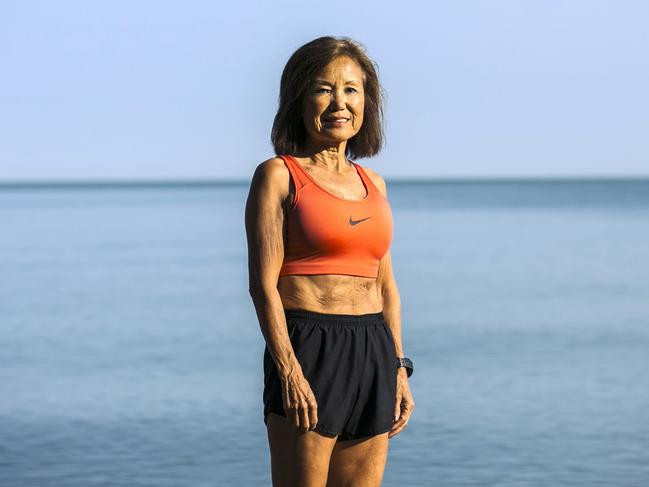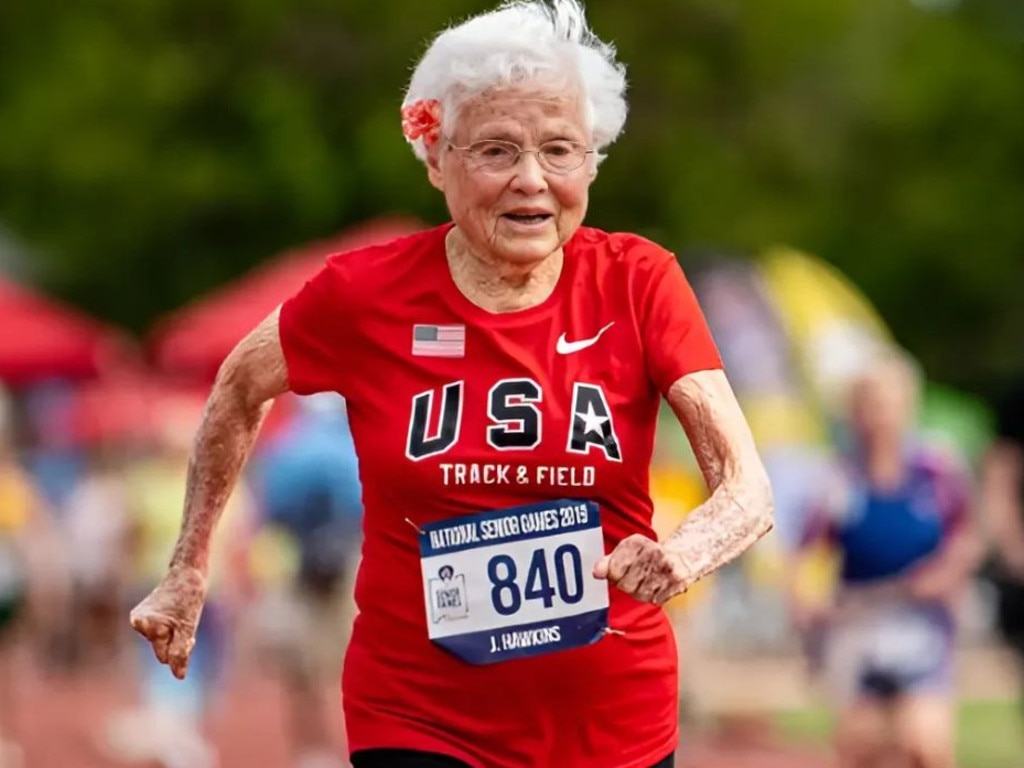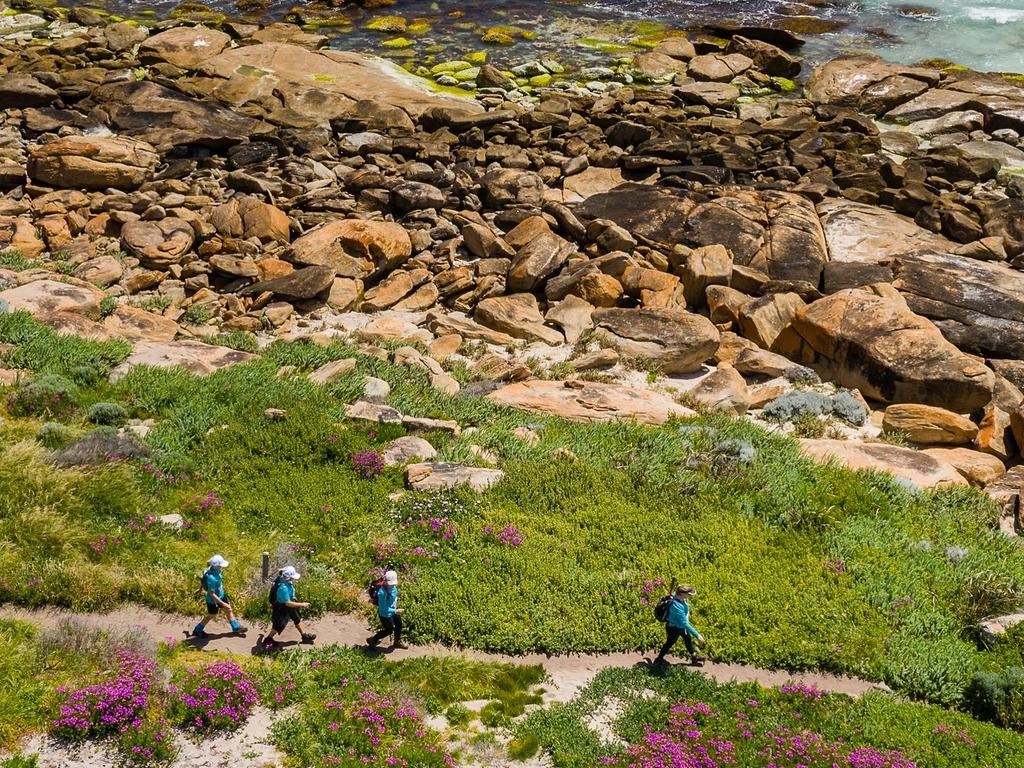The world’s fastest 77-year-old
Jeannie Rice is fitter than most women are in their 20s. Scientists are baffled but thrilled at her potential.

Let us pause to marvel at the magnificence of possibly the fittest old lady on the planet. Let’s take our time to appreciate not just the female athlete but the older female athlete, usually left for dust by the cultural conversation.
For anyone struggling to get their creaking knees into gear for the London Marathon on Sunday, or even to go from armchair to fridge, it may be useful to meet Jeannie Rice, who did barely any exercise until she took up jogging at the age of 35 to shift a bit of holiday weight. Now, at 77, this grandmother is not only breaking world records and thundering past runners a third her age, but also astonishing medical researchers. Rice is fast gaining fame as a running legend: she set a new world record for 75 to 79-year-old women at the London Marathon last year at 3:33:27; no woman her age has been recorded to run faster in the 1500m, 5km or 10km.
Moving swiftly on from that, what really intrigues is that on five occasions Rice has beaten all the men in her age group in the prestigious “major” marathons, including London and Boston – the only woman in the world of any age recorded to have achieved this feat. Men on average run marathons 10 per cent faster than women. After Rice won the Boston Marathon in her age group (male or female) in 2023 it took 20 minutes – 20 minutes is a lifetime! – for the next person in her age group, a man, to take second. That’s more than 3km at her pace.
Does it feel good to beat men? “It feels good,” she tells me. “As a joke, I tell my male friends, ‘Hey, what’s wrong with you, man? You can’t beat little me?’” Something in me wonders if their laughter is a little breathless.
Moving quickly on – raise your pace, people! – Rice was subjected to a battery of tests at Loughborough University for a recently published study that attempted to crack her secret. Sports scientists were amazed at her VO2 max – the maximum amount of oxygen the body can use during exercise: the key measure of fitness. Peter Attia, a well-known longevity expert, is among a group of doctors who argue VO2 max is also the best predictor of lifespan. Rice’s VO2 max was off the charts: the highest recorded for a woman over 75. It was at a level that would be considered good for a 19-year-old man, and in the top 10 per cent of twenty-something women. She beats her sons at running, she beats her Gen Z granddaughters. Rice is changing what we know about ageing.

When Amby Burfoot, editor-at-large for Runner’s World and a big name in the marathon world himself, first sought out a meeting with Rice, they shook hands and Burfoot immediately blurted out: “Can I take a photo of your legs?” She laughed and said yes. In recounting this story Burfoot tells me not to judge him “for gawking at Jeannie’s legs”; they are, he says, a miracle of physiology. He prizes his photo of “among the most muscular, toned legs I’ve ever seen”. I sigh. At 77 I would love to be running at all. It would be my dream for men to fall on their knees at first sight of my legs and request a photo for their website. Go ahead and gawk.
When I chat to her via Zoom, Rice has changed from her running gear (five easy miles, or 8km, today), which she calls “almost like a rest day") into glamour: a Diana Rigg-style bob haircut, blue eyeshadow, turquoise earrings, styled like a Sean Connery-era Bond girl. I ask her what her one bit of advice is to anyone as they age. She smiles. Ageing isn’t that interesting to her. “We all get old, right? Everybody is getting older every year. So don’t tell yourself you’re getting old. What we want to do is to get better.
“My advice is keep moving and set your goal. You have to make it your own goal. It doesn’t have to be to beat somebody or beat your own time. Whatever it is, set your own goal and aim for it.
“Young people tell me, ‘You’re an inspiration,’ and I love to hear it. I tell them age doesn’t mean you can give up. You’ve just got to have a goal.”
Rice’s goal was never to run, let alone to be a world champion at pushing 80. In a way her story maps onto a feminist story of women in sports. She grew up in South Korea where, like so many countries in the 20th century, the boys did organised sport but there was nothing for the girls apart from dance or ping-pong. She moved to Ohio at 18 to go to nursing school, married and had two sons. She was busy, and didn’t manage much more than a weekly Jazzercise class to keep fit.
She was 35 when her sons joined a swimming club. Another mother spent the time waiting for the practice to end by jogging around the park, and entreated Rice to join her. It was March 1983, eight years after the marathon ban was lifted for women in the UK. Jogging seemed to be the new fad, “but I wasn’t that interested, I was busy with the kids”. However, Rice wanted to lose a few pounds and tried running around the block. She didn’t have trainers, “just an old pair of tennis shoes”. She couldn’t bear more than a quarter of a mile at first – “I was huffing and puffing”. Her parents told her running wasn’t good for women; her mother worried her insides might fall out.

By June she had pushed herself to last three miles (5km) and joined her friend at the park – “she slowed down for me”. By August her friend cajoled her into her first race, “and I was hooked. She never beat me again.” In 1984 she ran her first marathon in Cleveland in 3:45. (Rice remembers her stats like her babies’ birthdates.) “I had no idea how to train”, but in 1985 she was running the Boston Marathon in under 3:20.
Running shifted something in her marriage. It gave her itchy feet. “My husband didn’t stop me running, but he never came to watch me,” she says. “I used to race every weekend. If there’s a race, I’ll go. I used to win many, many races. I got faster.” Her husband read about her in the local paper on Monday, but didn’t do much in support.
“Running around the world became my dream. That couldn’t be with him. He was a nice man, but that’s when I knew we were different. He was just happy being home and working. He wasn’t the type of person to travel and encourage me, he didn’t want to go anywhere.”
After 17 years of marriage they divorced. She began working in property and remains single. “But look at how long I ran. I’ve run 133 marathons all over the world.”
For four decades, her own simple formula (she has never had a coach) is unchanging. She runs 50 miles a week, mostly with club-running men in their forties. She needs the competition; when her son was in his 20s he trained to beat her at the marathon, “but he couldn’t do it”. She beat him by an hour.
She weight-trains her arms three times a week. She is a lifelong pescetarian, living mainly on five foods: salad, vegetables, rice, fish and nuts. She eats half a slice of toast with peanut butter and drinks a coffee with cream before heading out to run in the morning. Lunch is typically salmon with salad; dinner is something like a prawn stir-fry. “I eat a lot of rice.” She drinks champagne, but only as a reward after a race. She takes a statin, calcium, iron and vitamin D but no other pills. She shuns sweets, “maybe one bite of birthday cake just to taste”. She loves ice cream and used to eat it every day, but renounced it because it stopped her reaching her favourite racing weight. “I tell people to carry a pound in each hand and try to run with it. It’s hard.”

She was always a quick runner – she did 5km in 18 minutes at her fastest – but never extraordinary until she reached 70 and other runners faded away, leaving Rice in a class of her own. She says she feels as strong as she did in her 50s, and aged 75 improved her Boston Marathon time of ten years earlier by five minutes. “I never thought I could be a world-record runner. Amby Burfoot said to me runners’ times, especially men, start really dropping in their seventies. ‘But Jeannie, you are gliding’.”
This lack of decline caught the attention of Bas van Hooren and Michele Zanini at Loughborough University. Six days after her world record at the London Marathon last year, the sports scientists brought Rice into their exercise lab for a study for the Journal of Applied Physiology. I asked Zanini, a doctoral researcher on elite distance runners, if the results were surprising. Yes, he replied. He expected her to have an excellently efficient way of running to compensate for the decline in fitness seen with ageing. Instead her running economy was just ordinary, and he can’t stop talking about her fitness.
What we now learn from Rice is that it is possible for athletic seventy-somethings to have the fitness of their grandchildren. She has given scientists a new hypothesis: maybe in old age excellent physical health comes from a lot of “steady” exercise rather than “hard”.
“Her VO2 max was measured at 47.9, the highest ever recorded for a woman over 75,” Zanini says. “That would still place her among the best 10 per cent of 20 to 29-year-old females.
“Also of interest: to maintain a functionally independent lifestyle in old age you require a VO2 max of about 15. Her VO2 max is 3.2 times above that, and even with an expected 23 per cent decrease per decade, Jeannie’s would be due to remain above this threshold well beyond the age of 110.”
Burfoot, who won the Boston Marathon in 1968 and is an energetic champion of older marathon runners, says the scientists’ best guess at Rice’s achievement is something like the tortoise and the hare. Even though 80km a week sounds like a lot to mortals, it is conservative by elite marathon standards. Moderate training helps to prevent injury setbacks; her consistency and the psychological fire behind it is her superpower.
“Jeannie’s history reminds me of research that was done on Paula Radcliffe during her career,” Burfoot says. “Like Radcliffe, at first Jeannie was good, then better, now best. The secret, as far as anyone can guess it: absolutely consistent training.”
In the extreme distances of ultra-marathons “here and there” women beat men to first place, Burfoot says. But “I don’t know any other female runner who has done this in world marathon majors contested by tens of thousands of other runners”.
In Boston in 2023 Rice would have been expected to run 10 per cent slower than men in her age group. “Jeannie took a 20-minute disadvantage and turned it into a 20-minute victory margin – huge,” Burfoot says. “It will be exciting to see how much Jeannie can push back the boundaries of ageing. At any rate she is an inspiration to all ageing runners, whether male or female.”
Rice told me to always have a goal. What is hers? She has a few: to beat her own world records. To be running marathons in her 80s. And, most important, she hears the Grim Reaper’s footsteps in the distance behind her. Like many other men who have tried to catch her, she is going to give that guy the run of her life.
“I’m doing four marathons all over the world this year. Friends say, ‘Why are you doing so many?’ The reason is, I don’t have a lot of time left,” she says. “I’m healthy, but no one lives for ever. I have maybe 10, 15 years if I’m lucky. For running maybe five years? That’s what I tell my friends. ‘I’m in a hurry! I’ve got to get this done’.”
The Times




To join the conversation, please log in. Don't have an account? Register
Join the conversation, you are commenting as Logout